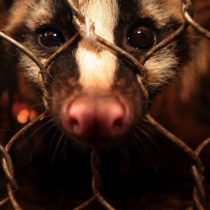
There will be few positive aspects to take out of the coronavirus. But the global pandemic may be a key moment in attempts to tackle the illicit wildlife trade.
The media has generally focused on effects rather than causes. In particular, as far as global implications for public health and the economy, it is also essential to determine the duration of the pandemic and find its initial cause as soon as possible.
What we know to date is that the epicentre of the disease occurred in the Chinese city of Wuhan, a major wildlife trade center, both legal and illegal. The outbreak is believed to have originated in a market where a wide variety of meats and other animal products were sold, including peacocks, porcupines, bats and rats. In addition, it was a market where standards of regulation and well-being were, at best, rudimentary.
Some of this trade is legal under Chinese law, but the coexistence of an illegal market – often within the same market or even in the same position – allows some sellers to introduce illegal wildlife products into the system. This situation is very difficult to regulate and control.
We are also very confident that transmission occurred due to contact between animals and people, similar to what happened in previous contagions such as Ebola viruses and SARS. In all these cases, the existence of large wildlife markets, with unsanitary and poorly regulated conditions, created an ideal environment for diseases to be transmitted between species. In a country like China, which has a culture where wildlife consumption is completely common, this contagion can spread quickly and, in fact, this has happened.
The Chinese government has long argued that they have a “sustainable consumption” of wildlife in the country. However, it responded to the current crisis by enacting a temporary ban on these markets, effectively closing an important sector of its domestic wildlife trade.
Biosecurity, public health and economic impact
In the longer term, the pandemic can provide the impetus needed to adequately address the problem. This is because, while the illegal wildlife trade has been criticized primarily in terms of conservation, it is now also being considered what relationship it relates to more complex issues such as biosecurity, public health and the economy.
The COVID-19 outbreak has brought to light the magnitude of this industry in China, with a temporary ban affecting some 20,000 captive breeding companies and 54 different species that can be marketed nationwide. A report by the Chinese Academy of Engineering estimates that the wild animal husbandry industry is valued at about $57 billion annually. These breeding centres can operate by taking advantage of the gaps in Chinese law, which could be considered contrary to the spirit of the Convention on International Trade in Endangered Species of Wild Fauna and Flora.
It is more difficult to quantify parallel illegal trade, but globally, the United Nations has estimated that this activity generates about $23 billion. Given that the resulting pandemic could cost up to US$2.7 trillion, purely economic criteria would suffice to increase regulation.
However, there are compelling arguments for dismantling wildlife trade: animals remain in deplorable conditions and thus only accelerate their disappearance in the wild. But in China the temporary ban remains just that, temporary. The most critical claim that we have experienced this situation before with SARS and that once everything returned to calm after that outbreak, China resumed its activities as if nothing.
In practice, what does it mean to seriously address the wildlife trade? First, breeding centres for endangered species such as tigers or pangolins would close permanently. This would make it much more difficult for their products to be introduced through legal channels and sold under the label of more expensive “free-caught” products.
The authorities are currently needing to monitor these centres closely to detect money laundering. Moreover, its closure would mean the release of resources to disrupt supplies of illegal products entering China from abroad.
This measure would also help reduce demand. Public education campaigns inform the public about how wildlife trade (both legal and illegal) harms endangered species, but the message is contradictory: the presence of a parallel legal market still it gives these products legitimacy and sends the message that “it’s OK to buy them,” which increases demand rather than decreases it.
In any case, the new Chinese ban excludes products such as tiger bones that are used in traditional medicine. Some conservationists and activists are concerned that this exemption will lead to the legalization of trade on the assumption that better regulation will protect the population from future outbreaks. This argument is extremely difficult to validate and most conservationists support the total ban.
Another concern is that since humans have little memory, once the danger has passed, public concern will become the next big problem.
COVID-19 clearly represents an unprecedented opportunity to combat wildlife trade and ensure that animal-borne diseases do not mute and infect people. However, only time will tell whether this opportunity will be seized or postponed once again until the emergence of the next pandemic – perhaps even more contagious – poses an even more serious global biological threat.
This article has been translated with the collaboration of Casa Africa. Translation: María José Estupiñán Hosse and Andrea Zamora García.
Simon Evans, Principal Lecturer in Ecotourism, Anglia Ruskin University
This article is republished from The Conversation under a Creative Commons license. Read the original article.
"El reclamo puede ser genuino, pero construido sobre una mentira", apuntó el presidente Javier Milei…
El gobernador de la provincia de Buenos Aires, Axel Kicillof, encabezó un acto en Ensenada…
El diputado nacional de La Libertad Avanza, José Luis Espert, expresó su confianza en la…
Tras la masiva reaparición de Cristina Fernández de Kirchner, el presidente Javier Milei apuntó contra…
El principal propósito de la nueva comisión es evaluar los recursos humanos en el Senado,…
En una medida que busca redefinir las condiciones de los seguros de automóviles en Argentina,…
Esta web usa cookies.